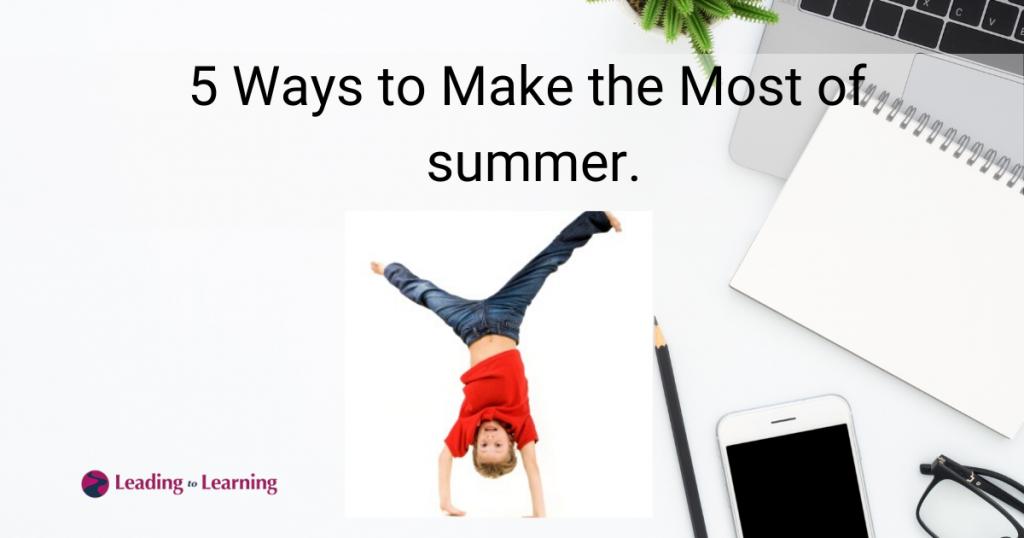Summer is here and the lessons that had been set by teachers, either in class or on line, are no longer part of your child’s life. Children are no longer expected to learn and complete schoolwork. The long weeks of the summer break beckon.
Not having to learn new things and do new work comes as a relief to most children. They welcome the break from the structure and requirements of school learning. But there is something else at play during this time of relaxation and enjoyment. It is called summer learning loss.
Summer learning loss happens when children forget what they have been taught because they have little chance to review or practice schoolwork. Their minds are on other things. The knowledge and information that teachers had been sharing hasn’t had time to settle into their brains and is quickly ignored and forgotten. Children’s brains move out of learning mode and into play mode.
Teachers know that summer learning loss happens so they spend most of September reviewing the ideas and concepts students need to know before starting the new school year. They spend weeks helping students get their brains back into learning mode.
What a waste of learning time! Almost three months of every year are not being used to help children learn.
What if things could be different? What if children could continue learning all summer long?
You can make this happen. I do not want you to become your child’s teacher and try to get your child to do worksheets or send your child to summer school to learn more school work. I want you to help your child enjoy the summer while keeping their brains in learning mode. Then your child will be ready for a great start to the new school year.
Here are five ways you can make that happen. Five activities that help your child develop the skills they need to be good learners. You don’t have to use them all. Choose one or two that suits your summer schedule.
A note of warning. These activities are meant to be fun. There are no tests or marks to work towards. Your child will probably make mistakes and that is fine. Your role is not to tell your child what to do but to suggest and activity and provide anything the child needs to do that activity. That is all.
Enjoy!
A Project
Let your child choose a project for the summer.
You could give him or her a list of ideas such as, creating a family history, building a fort in their bedroom, running a lemonade stand, making a book about dinosaurs, cooking one meal a week for all the family, creating a comic book, collecting samples of all the street names/plants/street furniture/stores and what they sell/types of houses/ in the neighbourhood.
A project could be related to a hobby your child enjoys. Can he or she create a list of the best soccer teams and their players, learn three new guitar tunes, grow food in the garden….?
The possibilities are endless. But let your child choose the project, do not make him or her do something you suggest. And don’t worry if the project only last for a couple of day – encourage your child to start a new one.
When children do a project they are using skills of planning, responsibility, creativity, production and processing. All skills they need in the classroom. Always celebrate the effort a child puts into a project no matter what the outcome.
Performance
Encourage your child to create a performance that, when finished, can be shared with family and friends.
This type of activity appeals to children who are both People Smart and Self Smart and can include activities such as making music, dancing, writing a play and acting it out, taking a series of photographs on a particular subject, creating video animations, or taking videos to make a movie.
Children who create performances use planning, movement, musical, processing and production skills as well as specific skills related to their chosen topic.
This performance can be as short as a couple of minutes or as long as the child wants it to be. Don’t worry if the performance doesn’t get finished or gets changed often. Let your child enjoy the process and be amazed at what he or she creates.
Board games
Now this activity really is for a child who is People Smart and likes to work and play with others. Self Smart learners tend to prefer games such as chess or cards.
There are many board games available both in store or on-line. If you like board games you can set up a weekly board game session to play with your child. Depending on the game you chose you will be using skills of prediction, processing, and understanding while having family fun.
Journaling
I know, this can be boring and of little interest to children who like to live in the moment, but there are ways to make this process exciting.
Your child can write your dog’s journal – what the dog would write if it could! Or it could be a journal about who passes the house during the day or what TV programs the child watches.
It doesn’t have to be written. Your child can create a picture journal, draw a picture of something that interested him or her that day or make a list of things he liked/didn’t like during the day. The idea is to set aside a few minutes every day to add something to this summer story. Your child could grow a bean in a pot and measure it every day or write one sentence of a story each day.
The child benefits from having to do this daily (responsibility), the act of putting information onto paper (production), working out what to do (planning) as well as all the other skills such as writing, reading, and drawing.
Keep it fun. Make a space where the child can keep the journal and everything needed to add to it. At the end of the summer make a big deal about going through it and reminding both you and your child of the process.
Keep the journal – always good to look at and wonder about later in life.
5. Plan a trip
We are limited in how we can travel at the moment. But that doesn’t stop us imagining what could be. Where would you like to go? Where would your child like to go?
Ask him or her to create a full travel itinerary for a chosen trip. It should include air flights, hotel bookings, sightseeing trips, types of food to eat, clothes to wear, the list goes on. It should entail research about different places, reading timetables and checking availability of travel options, costings and exchange rates, gathering pictures of the proposed trip, and end with the creation of a brochure that illustrates the whole trip.
How about planning a round the world trip? Where would you go? How would you get here? What would you see? How much would it cost?
Who knows – you might be using this information next year!
This activity will increase your child’s ability to research a topic and to choose the aspects that interest him or her. Your child will be using and developing skills of attention, prioritizing, research, reading, writing, math, as well as having fun.
Lastly, one more activity that is so pervasive that it almost goes without saying – almost!
The one activity that overrides all others is reading. You knew I was going to say that didn’t you? But many kids don’t like to read especially when there are other things to do. Please don’t force your child to read when he or she isn’t interested. Doing that is a good way to turn a child off reading forever.
The five activities mentioned here include reading as a standard part of the process. By incorporating reading into these activities your child will be getting the reading practice he or she needs.
Or, you could always get your child to write their own scary story – complete with pictures – and then ask them to read it back to you as you cower under the covers!
Have fun this summer. Don’t add stress by trying to catch up with school work. If you keep your child’s mind active and ready for the new school year all will be well.




